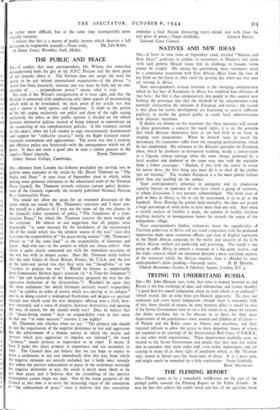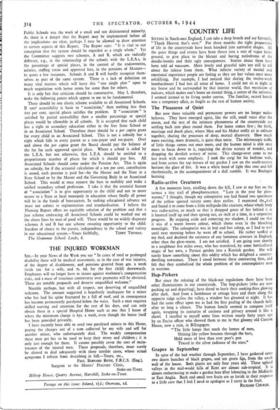THE FLEMING REPORT Snt,—There seems to be a remarkable indifference
on the part of the genesal public towards the Fleming Report on the Public Schools. It may be that this reflects the public mind and that all the agitation about
Public Schools was the work of a small and not disinterested minority. As there is a danger that the Report may be implemented before all the implications are clear, perhaps I may be allowed to draw attention to certain aspects of this Report. The Report says: " It is vital to our conception that the system should be regarded as a single whole." Yet the Committee suggests two schemes, A and B, which are radically different, e.g., in the relationship of the schools with the L.E.A.s, in the percentage of special places, in the control of the endowments, salaries, staffing ratios and approved fees, in the pensions of Masters— to quote a few instances. Schools A and B will hardly recognise them- selves as part of the same system. There is a lack of definition on many vital matters which will leave this "one single plan " open to much negotiation with better terms for some than for others.
It is only fair that criticism should be constructive. May I, therefore, make the following points which appear to me to be fundamental.
There should be one elastic scheme available to all Associated Schools. If total accessibility is basic to "association," then nothing less than too per cent, special places satisfies the problem. If "association" is satisfied by partial accessibility then a smaller percentage ot special places would be allowable in all schools. It is accepted that each child has a right to secondary education either in the free State School or in an Associated School. Therefore there should be a per capita grant for every child in an Associated School. This is not a subsidy but a right which falls to every parent as a rate-payer and tax-payer. Over and above the per capita grant the Board should pay the balance of the fee for each approved special place. Where a school is aided by the L.E.A. but not otherwise, that L.E.A. should be entitled to a proportionate number of places for which it should pay fees. All Associated Schools should come under the Pension Act. This is again no subsidy, for if the actuarial calculation of a ten per cent, contribution is sound, each pension is paid for—by the Master and the State in a State School or by the Master and the Governing Body in an Associated School. This would at once remove the bars to mobility and make a unified secondary school profession. I take it that the essential feature of " association " is to give opportunity to the child and not to move nearer to a State or local monopoly in education where finally all power will be in the hands of bureaucrats. In seeking educational advance we must not submit to regimentation and standardisation. I believe the Fleming Report offers no equitable solution of the problem and that a just scheme embracing all Associated Schools could be worked out on the above lines by men of good will. There would be no widely disparate schemes A and B but one scheme ensuring opportunity to the child, freedom of choice to the parent, independence to the school and variety in our educational system.—Yours faithfully, TERRY THOMAS. The Grammar School, Leeds, 6.



























 Previous page
Previous page